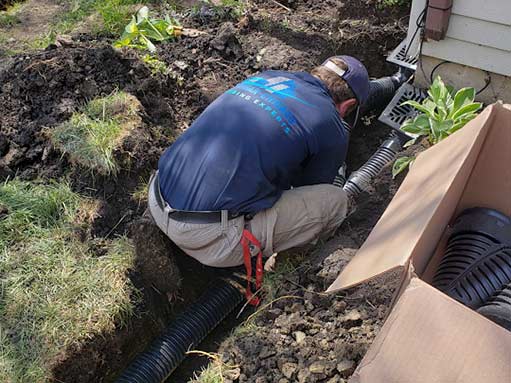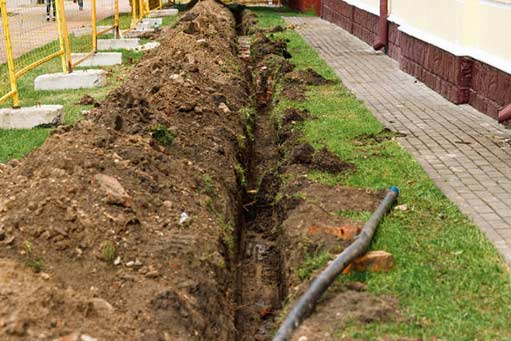
When it comes to preventing water damage and protecting your property, a French drain can be an effective solution. This type of drainage system is designed to redirect excess water away from your home, preventing water accumulation and potential structural issues. However, before considering a French drain installation, it is essential to understand the cost associated with this project. In this article, we will explore the various factors that influence the cost of a French drain installation, providing you with the information you need to make an informed decision.
The Importance of Proper Drainage
Before diving into the cost details, let’s first understand why proper drainage is crucial for your property. If your yard or basement is constantly flooded or retains excessive water, it can lead to a myriad of problems. Water accumulation can cause erosion, damage to your foundation, and even contribute to the growth of mold and mildew. Installing a French drain is an effective way to combat these issues by redirecting water away from your property.
Factors that Impact French Drain Installation Costs
Several factors come into play when determining the cost of a French drain installation. It’s important to consider these variables to get a better understanding of what you can expect in terms of expenses. Here are the key factors influencing the cost:
1. Size of the Area
The size of the area that needs drainage plays a significant role in the overall cost of installation. Larger areas require more materials, more labor, and more time to complete the project. If you have a larger property or need extensive drainage, it’s likely that the cost will be higher compared to smaller areas.
2. Complexity of the Terrain
The complexity of the terrain where the French drain will be installed also affects the cost. If your property has uneven ground or difficult-to-access areas, it may require additional excavation and preparation work. This can increase the overall cost of installation.
3. Depth of the Drain
The depth at which the French drain needs to be installed can influence the cost. Deeper drains require more labor and materials, leading to higher expenses. The depth of the drain often depends on the severity of the water accumulation issue and the type of soil in your area.
4. Type of Drainage System
There are different types of French drainage systems available, and the choice of system can impact the cost. The most common types include surface French drains, curtain French drains, and subsurface French drains. Each system has its own advantages and cost considerations.
5. Material Selection
The materials used for the French drain can vary in terms of quality and cost. The type of pipes, gravel, and other components chosen for the installation will affect the overall expense. It’s important to speak with a professional flood control specialist to determine the best materials for your specific needs and budget.
6. Labor Costs
The cost of labor can vary depending on factors such as location and the complexity of the installation. Labor costs typically include excavation, installation of pipes, backfilling, and any additional landscaping or restoration work required.
7. Permits and Regulations
In some areas, obtaining permits for French drain installation may be necessary. The cost of permits and any associated fees should be considered when budgeting for your project. It’s essential to check with your local authorities to ensure compliance with regulations and avoid potential fines.

Average Cost of French Drain Installation
Now that we have discussed the factors influencing the cost, let’s take a look at the average cost range for French drain installation. It’s important to note that these figures are an estimate and can vary depending on your specific circumstances and location.
On average, homeowners can expect to spend between $1,000 and $4,000 for a standard French drain installation. The cost can increase to $10,000 or more for larger properties with complex terrain. The price range includes material costs, labor, excavation, and any necessary permits. It’s always recommended to obtain quotes from multiple contractors to ensure you are getting a fair price.
Additional Considerations
When budgeting for a French drain installation, it’s essential to consider the long-term benefits and potential cost savings. While the upfront cost might seem significant, the investment can prevent costly water damage repairs in the future. Additionally, a properly installed French drain can increase your property’s value and enhance its overall appeal.
It’s also worth noting that opting for a professional installation is highly recommended. Hiring a reputable contractor ensures that the job is done correctly, maximizing the effectiveness and longevity of the French drain system. While DIY options are available, they may not provide the same level of expertise and warranty.
Summing it Up
A French drain installation can be an excellent investment to safeguard your property against water damage. By redirecting excess water away from your home, you can prevent structural issues and other related problems. Understanding the factors that influence the cost and considering the long-term benefits will help you make an informed decision.
Remember to speak with professionals, obtain quotes from reputable contractors, and ensure compliance with local regulations. With careful planning and budgeting, you can successfully install a French drain and enjoy a dry and protected property for years to come.

